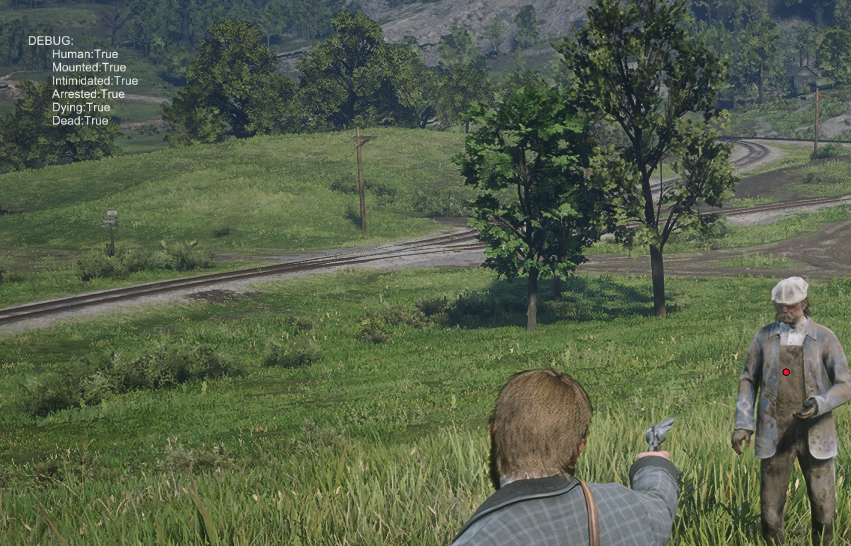-
[SOLVED] Are Ped Attributes Always True for Anyone Else?
Update: I've re-written this using the original Saltyq/ScriptHookRDR2DotNet and I am still having the same issue. Either this is a problem with my approach or the .Net wrappers are no good. Please let me know if anyone else has tried either of these wrappers and if they also give you trouble with simple GETs like this. In the meantime, I'll keep hacking away at this for today/tomorrow and delve into the C++ side of things if I find no luck.
-
SteeredWrong started following [SOLVED] Are Ped Attributes Always True for Anyone Else?
-
[SOLVED] Are Ped Attributes Always True for Anyone Else?
UPDATE: For anyone using either version of the .Net ScriptHook, I figured out what is going on and what to do about it: Under the hood, pretty much every function provided is just calling the ScriptHook API using Function.Call, so functions like ENTITY.IS_ENTITY_DEAD(Ped ped) are implemented as public static bool IS_ENTITY_DEAD(int entity) { return Function.Call<bool>(9032848150478474170uL, new InputArgument[1] { entity }); } Since the original ScriptHook is C++, 0 is falsey and 1 is truthy, so the NativeDB (at least on this site) reasonably documents these type of functions as boolean. However in the implementation of the ScriptHook API (or maybe the first layer in the .NET port) the return types are actually 1's and 0's, so the fix is to bypass the nice convinient wrapper functions these library provide and call the native function directly yourself with the type parameter being int instead of bool. i.e. Function.Call<bool>(9032848150478474170uL, new InputArgument[1] { entity }); OR Function.Call<int>(0x7D5B1F88E7504BBA, entity); //much prettier ---------------------Original Post-------------------------------------- I'm a C# developer and I've just started my first mod using Halen84/ScriptHookRDR2DotNet-V2 (the original download for ScriptHookRDR2DotNet recommends this version). I've been doing well enough transcribing what I've learned on this forum and elsewhere into my project, however for the life of me I can't seem to get any details about Peds. I've been able to play voice lines, animations, and Flee any Ped, so I'm certain the ped is valid. unsafe private void OnTick(object sender, EventArgs args) { int currentTargetHandle; PLAYER.GET_PLAYER_TARGET_ENTITY(Game.Player, ¤tTargetHandle); if (currentTargetHandle == 0) { PLAYER.GET_ENTITY_PLAYER_IS_FREE_AIMING_AT(Game.Player, ¤tTargetHandle); } var currentTarget = Entity.FromHandle(currentTargetHandle); Ped ped = currentTarget as Ped; if (ped != null) { string human = "Human: " + PED.IS_PED_HUMAN(ped.Handle); string mounted = "Mounted: " + PED.IS_PED_ON_MOUNT(ped.Handle); string intimidated = "Intimidated: " + PED._IS_PED_INTIMIDATED(ped.Handle); string arrested = "Arrested: " + TASK.IS_PED_BEING_ARRESTED(ped.Handle); string dying = "Dying: " + PED.IS_PED_FATALLY_INJURED(ped.Handle); string dead = "Dead: " + ENTITY.IS_ENTITY_DEAD(ped.Handle); var message = $"DEBUG: \n\t{human}\n\t{mounted}\n\t{intimidated}\n\t{arrested}\n\t{dying}\n\t{dead}"; TextElement textElement = new TextElement(message, new PointF(200.0f, 200.0f), 0.2f); textElement.Draw(); if(FleeFlag && ped.IsHuman) { Game.Player.Ped.PlaySpeech("PLAYER_GOADS_FLEE", "", eSpeechParams.AllowRepeat, 0); if (ped.IsCowering || ped.IsBeingArrested) { TASK.TASK_FLEE_PED(ped, Game.Player.Ped, 4, 0, -1.0f, -1, 0); } FleeFlag = false; } } } I think there's a pretty good chance it's the wrapper, but just in case I wanted to see if anyone else has been experiencing this issue. Is this an issue with the native functions in general, is this an issue with the wrapper, or am I missing something?
SteeredWrong
Members
-
Joined
-
Last visited




